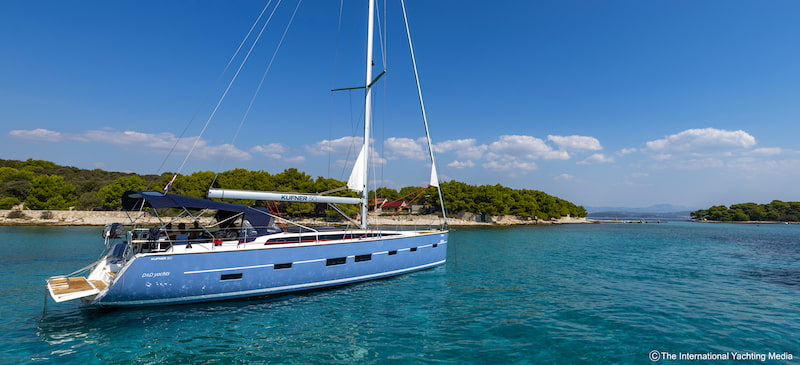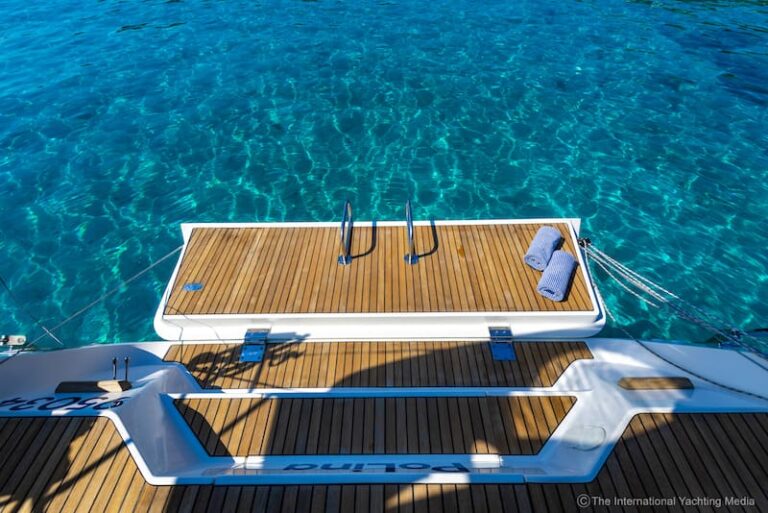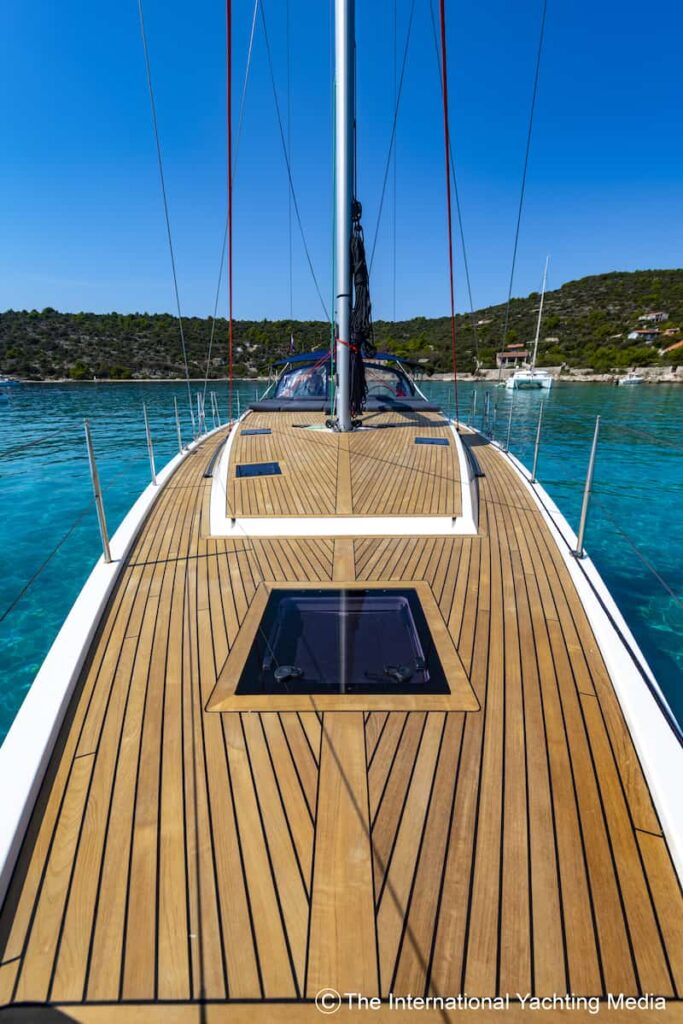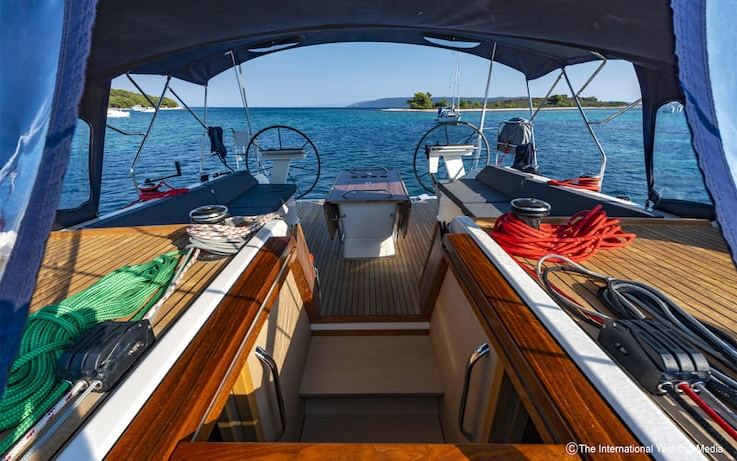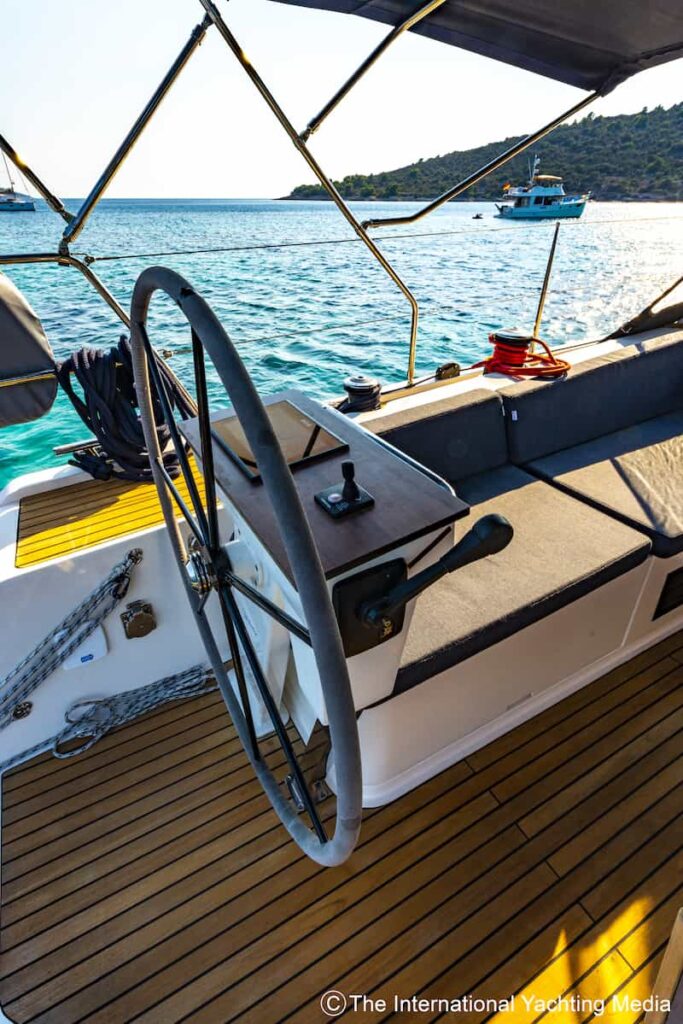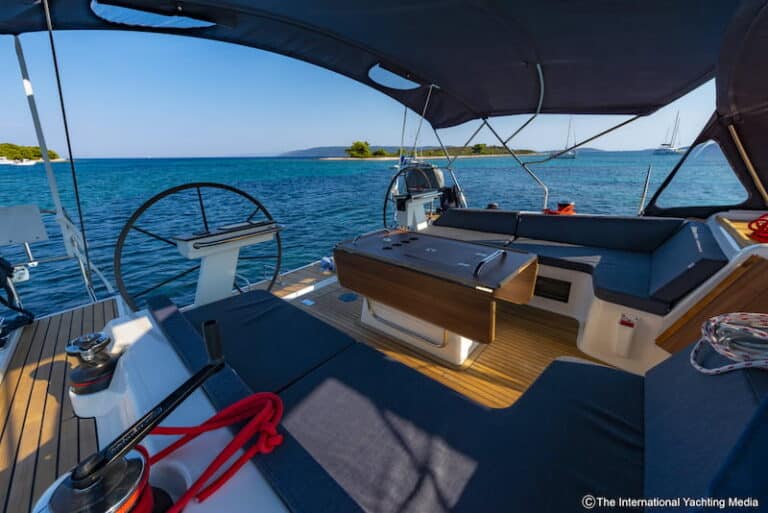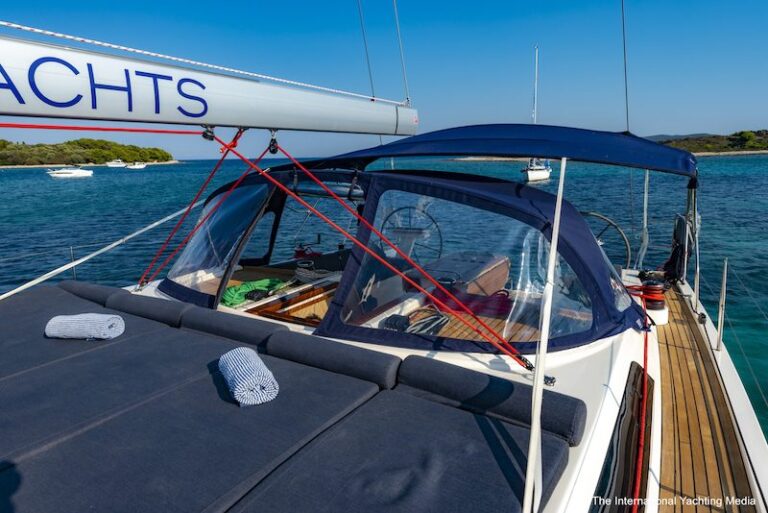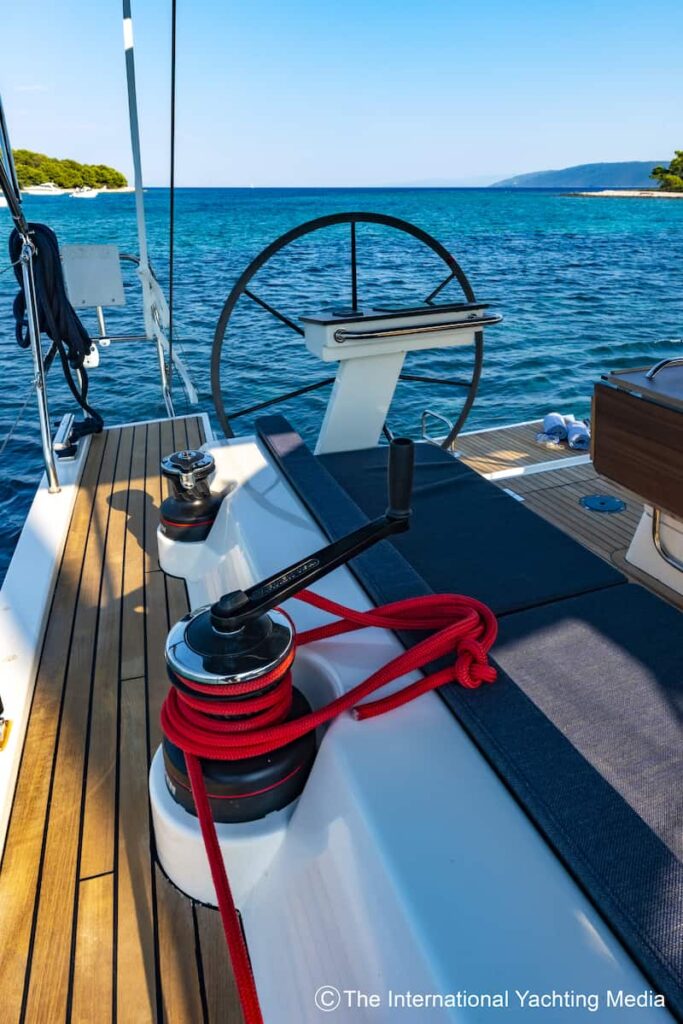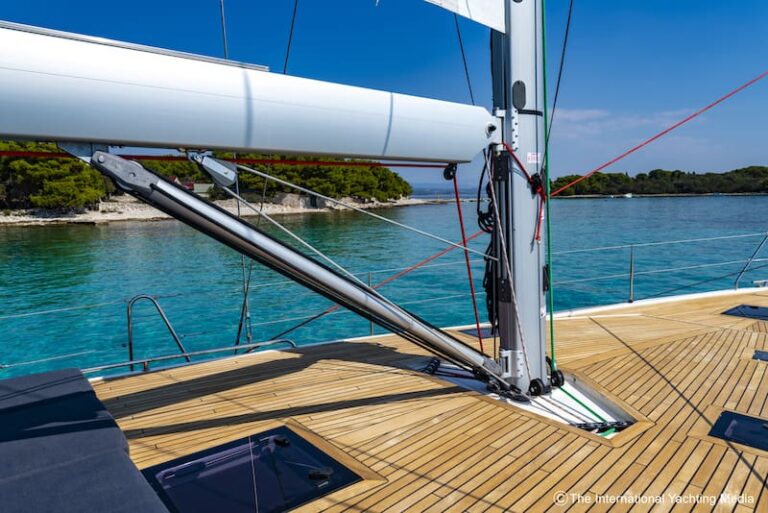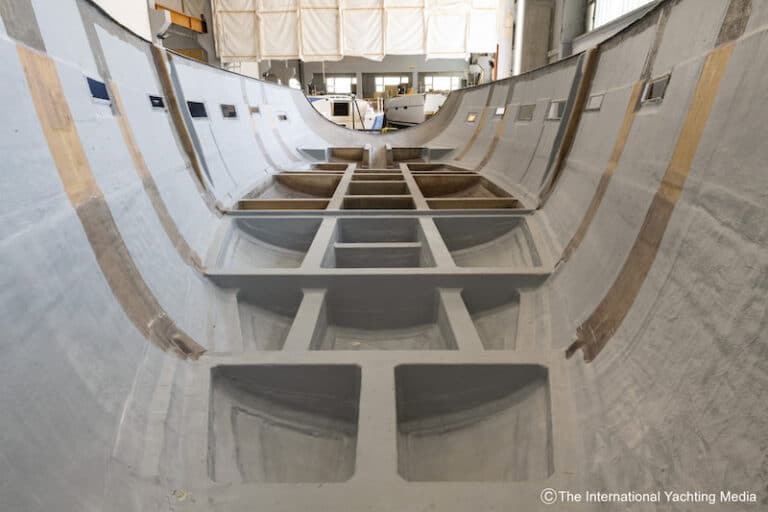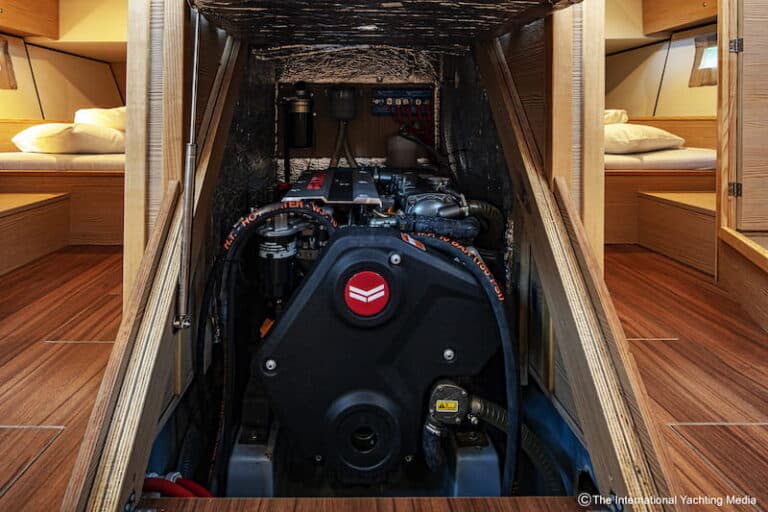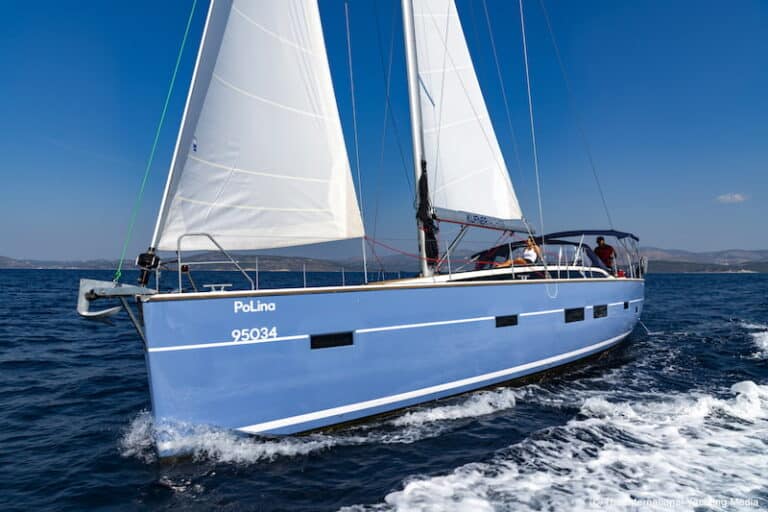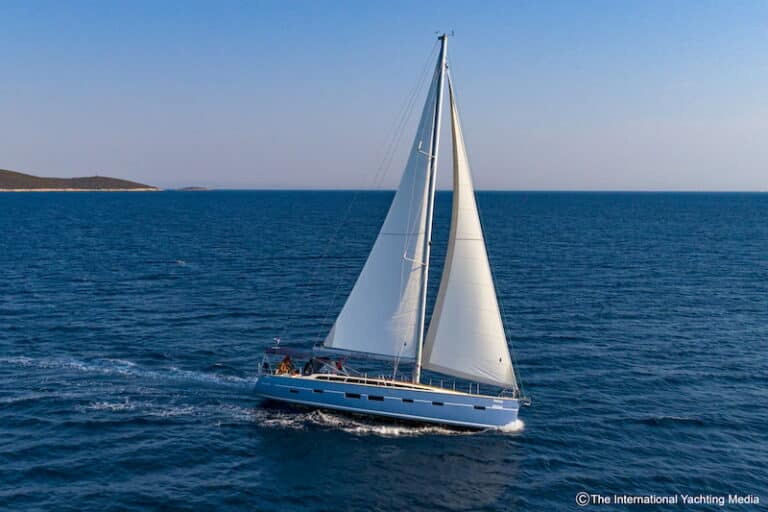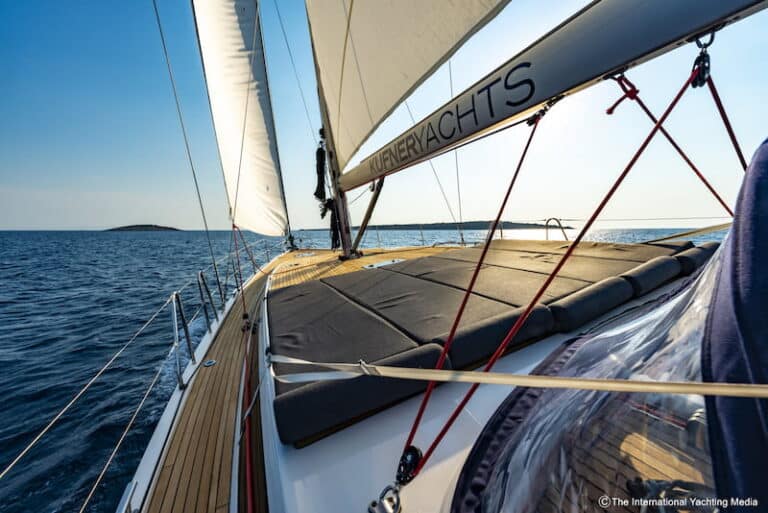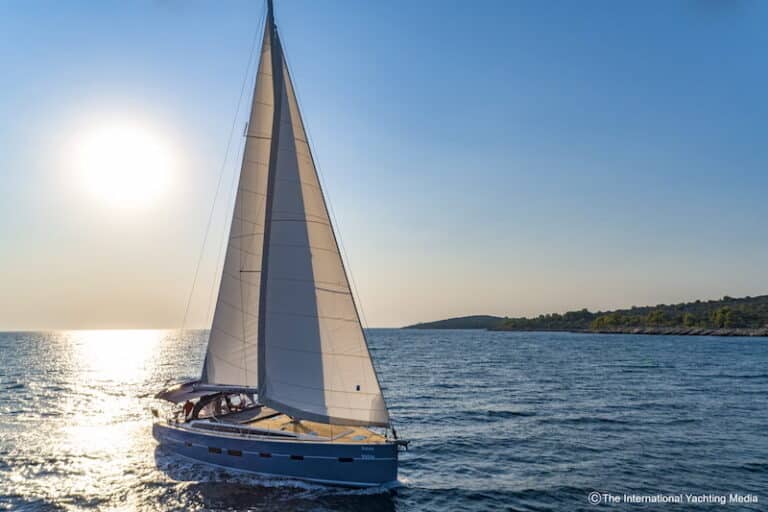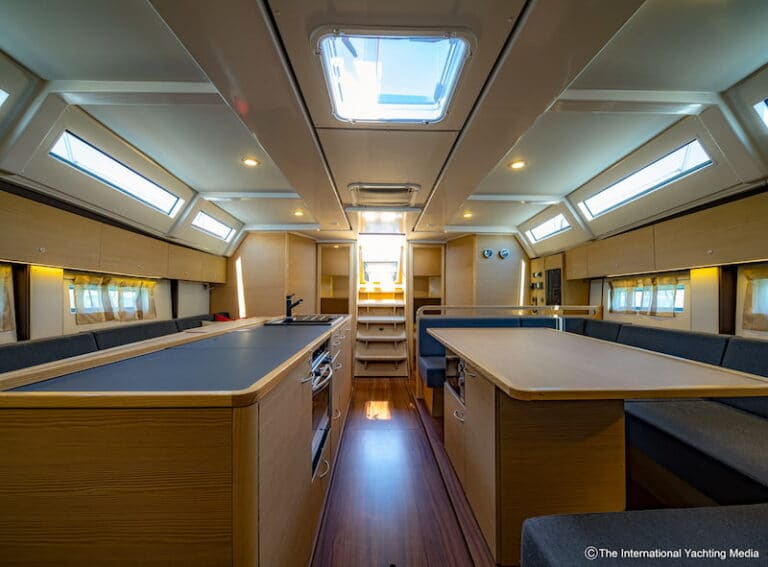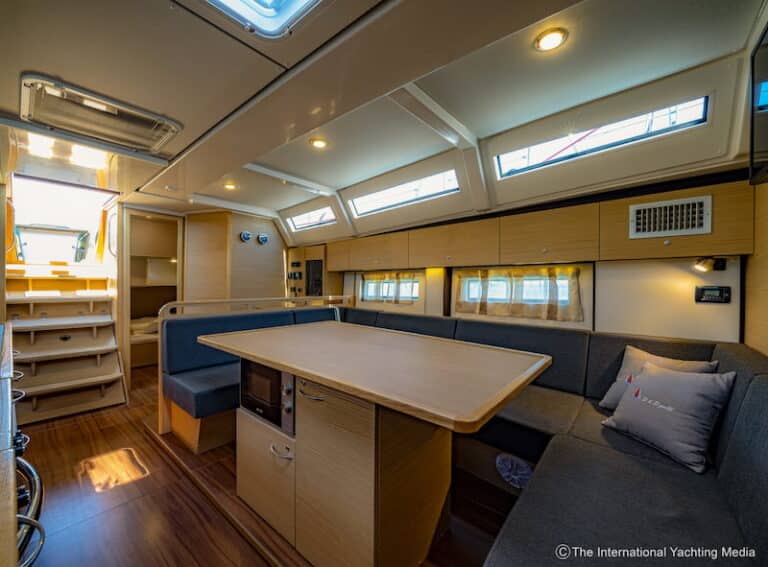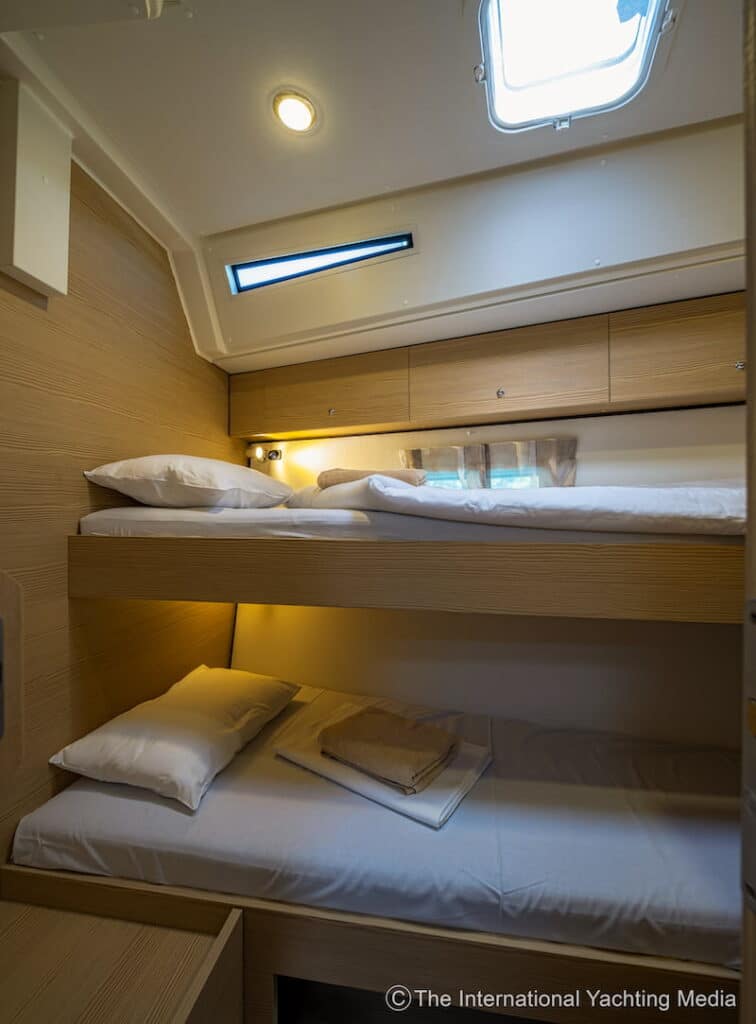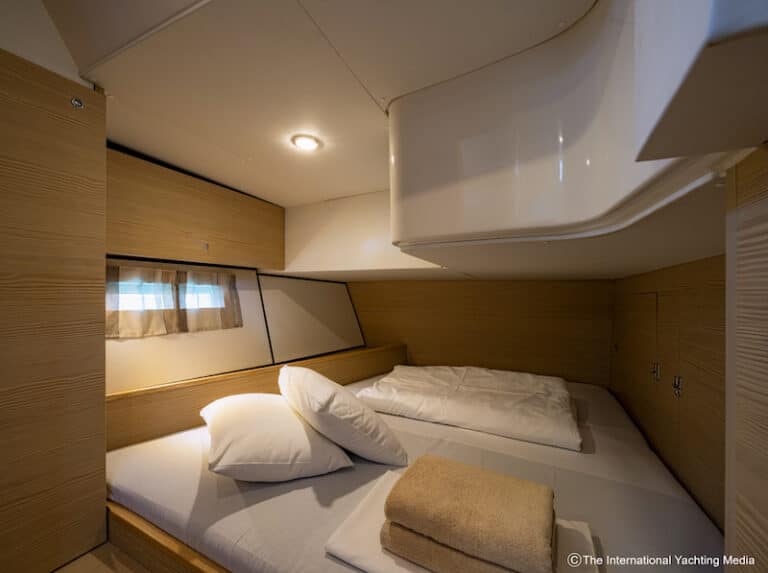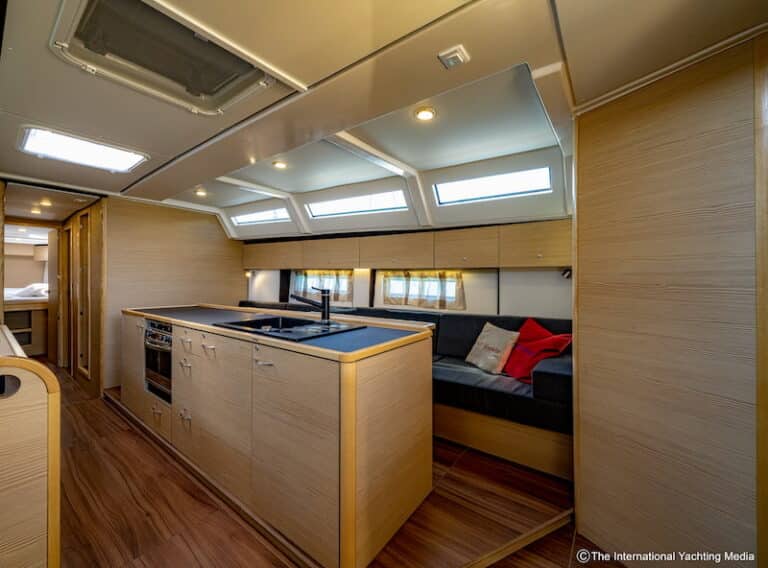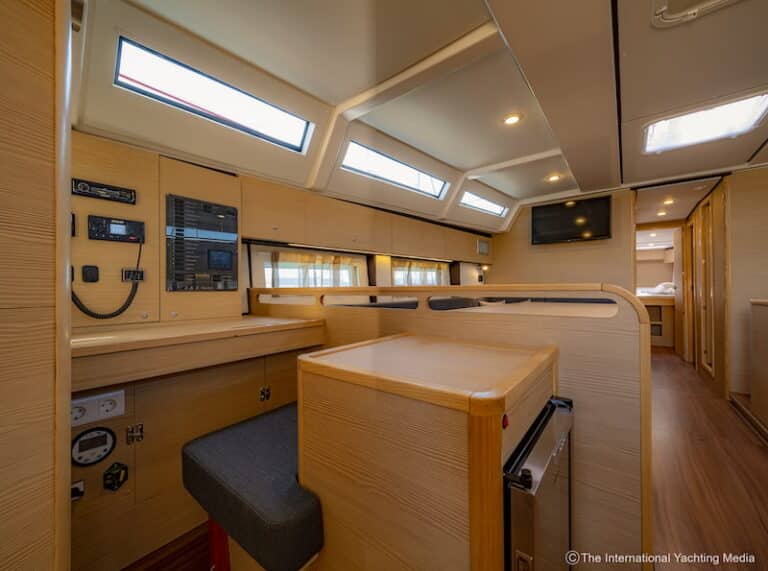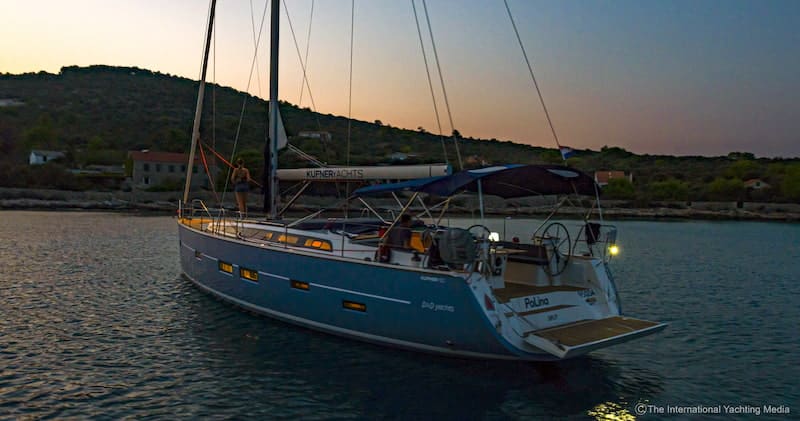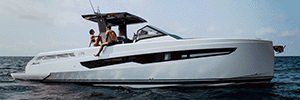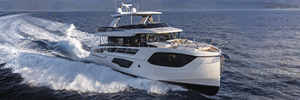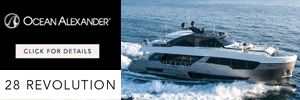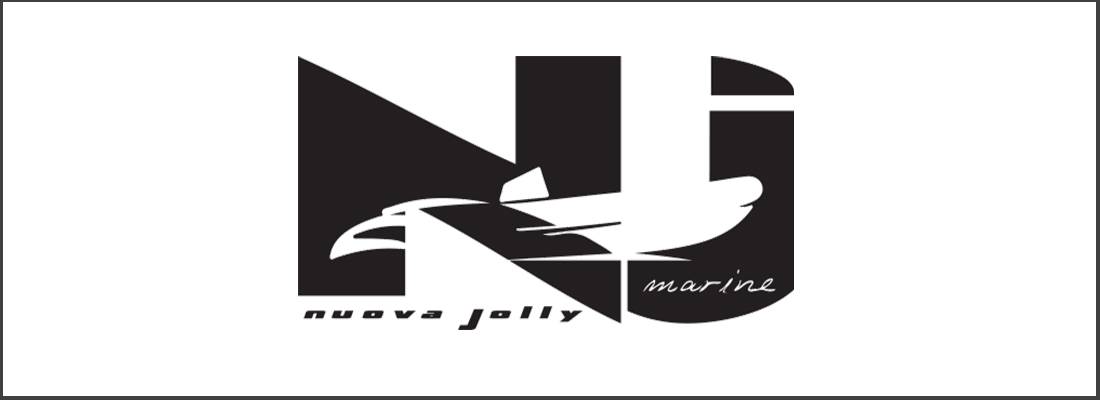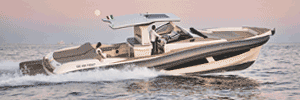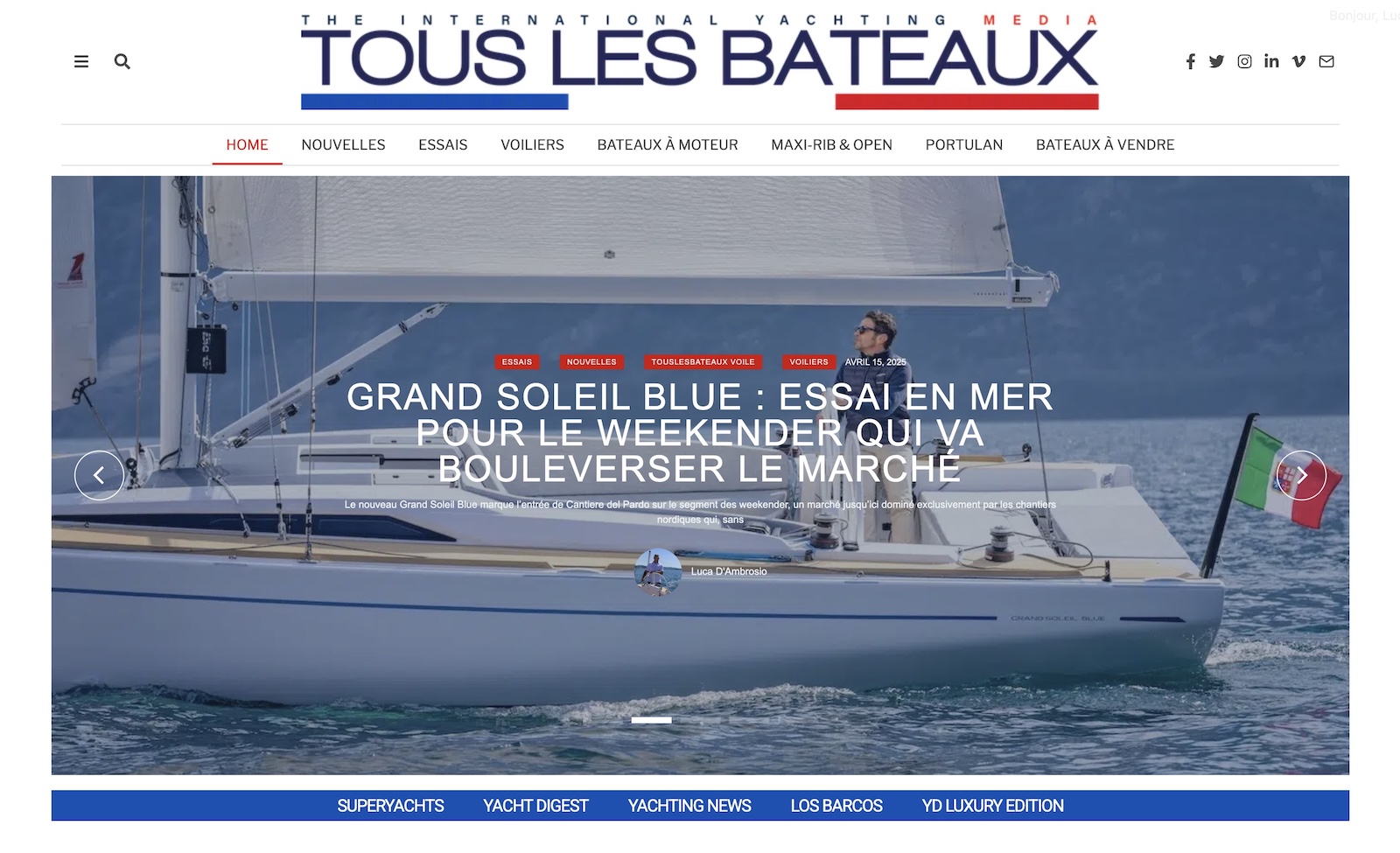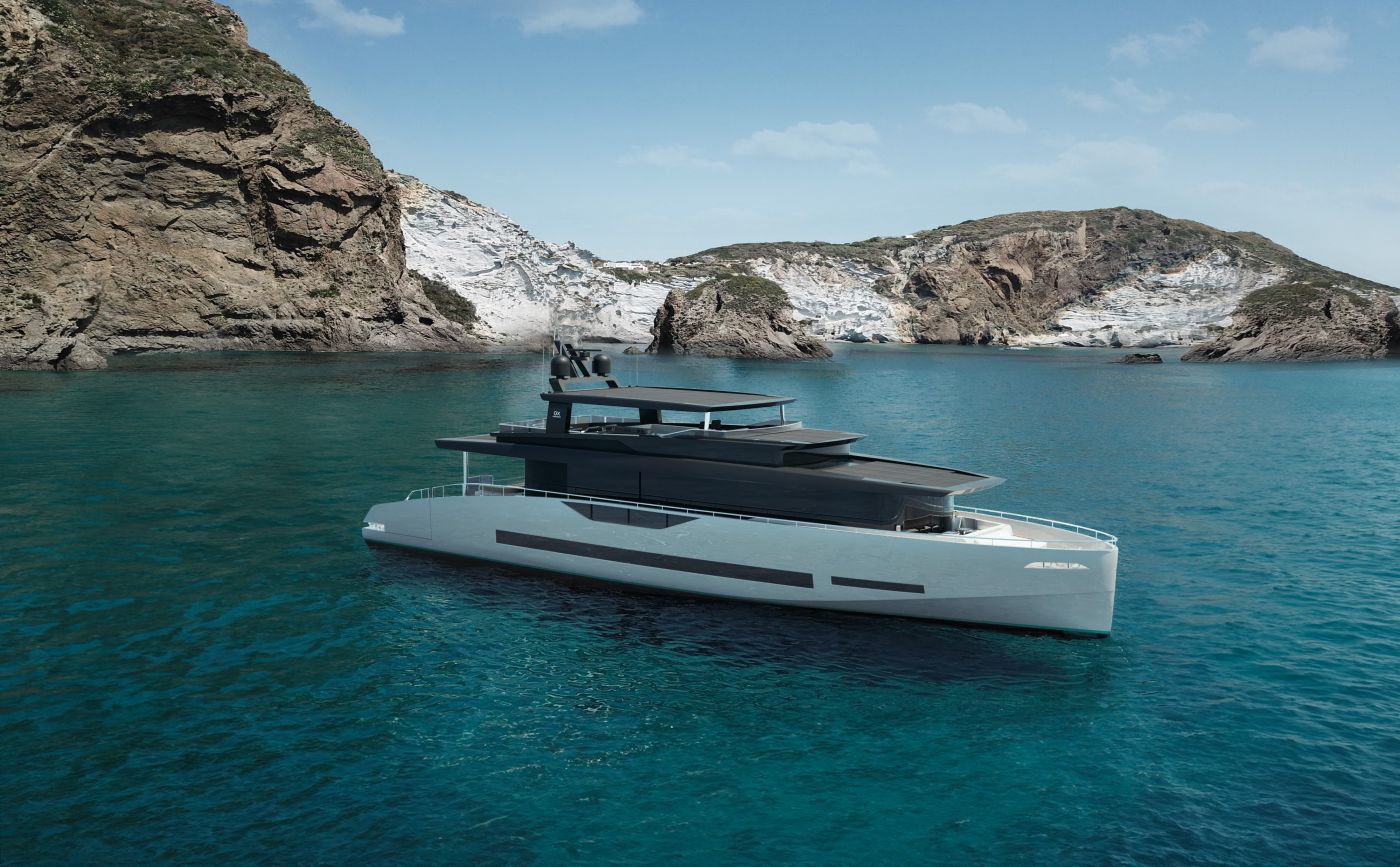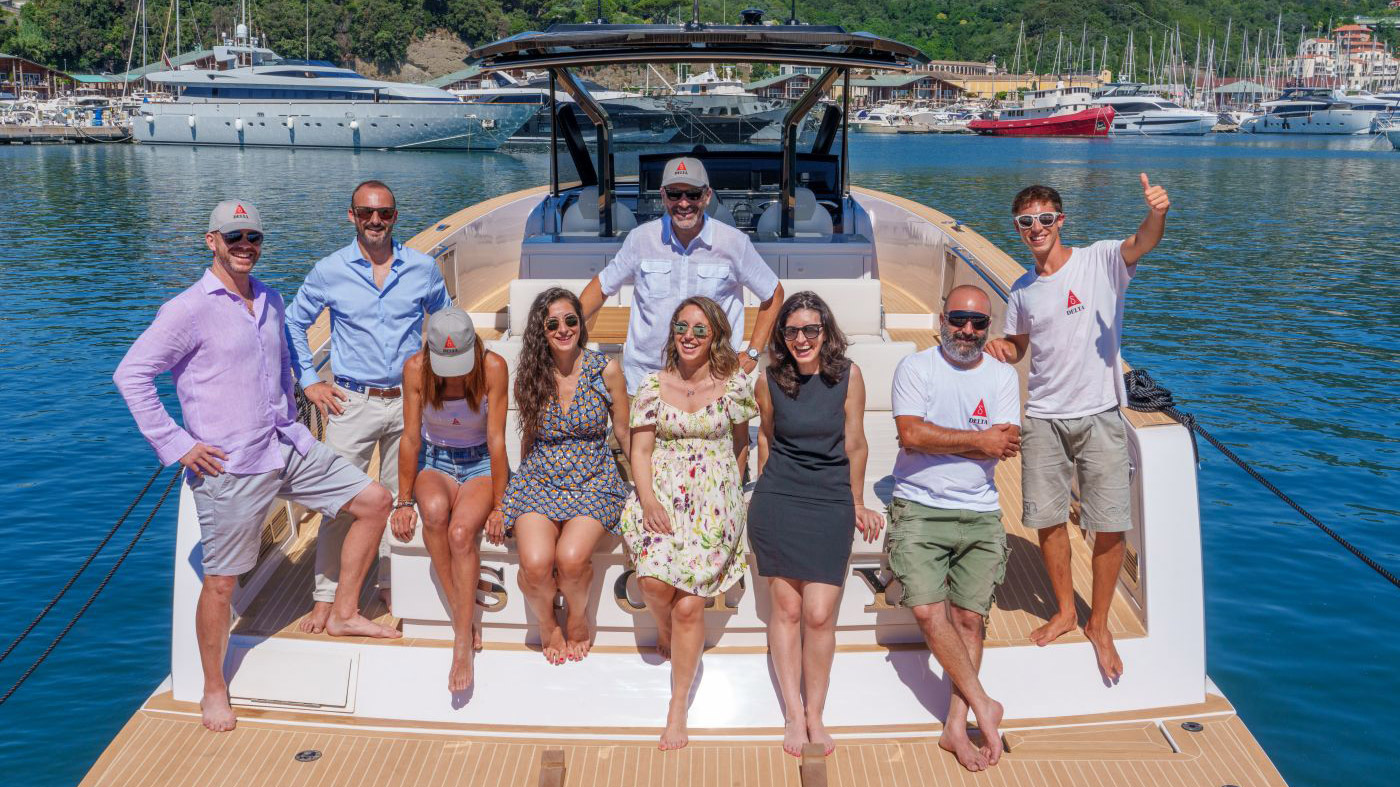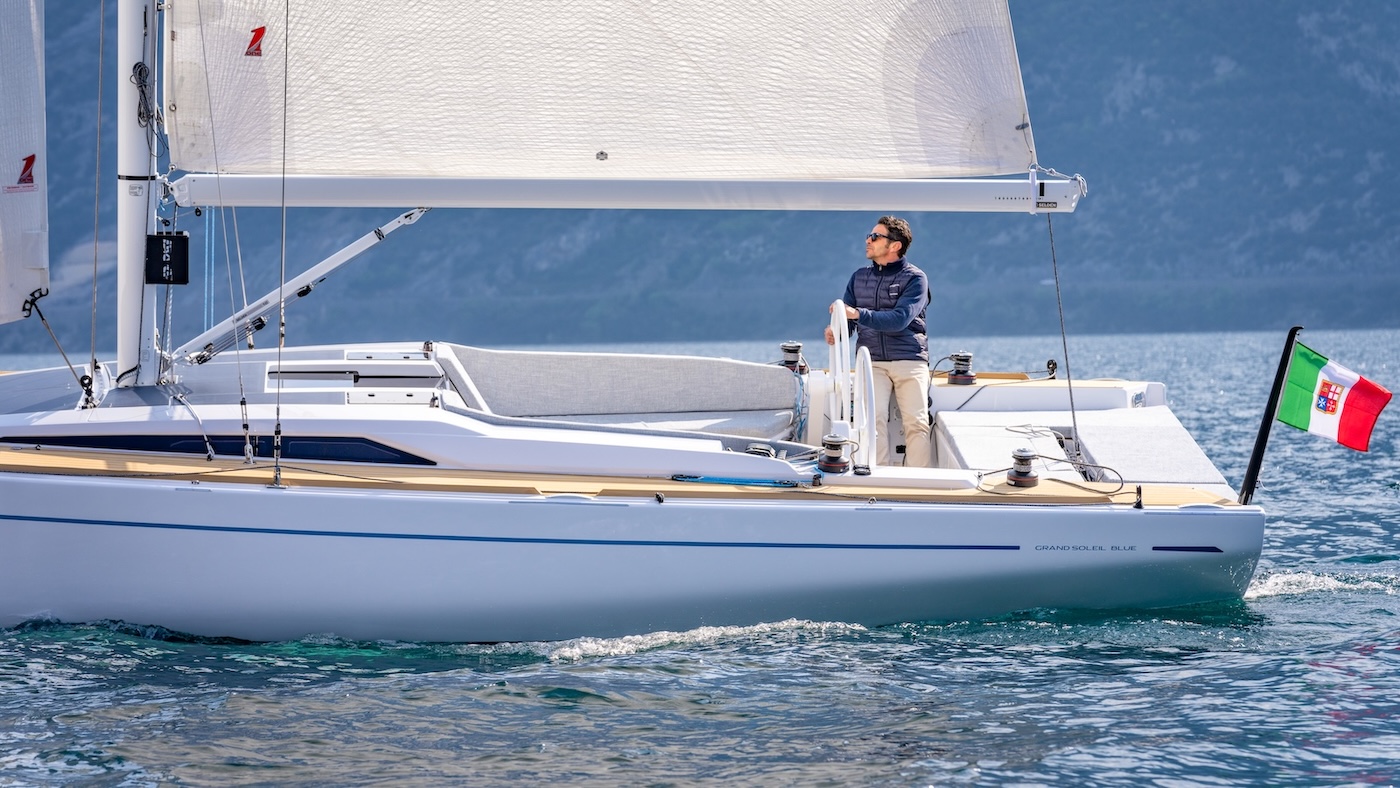Kufner 50, a stunning15-meter sailing yacht suitable for both chartering and cruising activities. Thanks to the semi-custom construction, the owner can choose the layouts, materials and accessories he prefers. A plus not to be underestimated.
A wonderful day welcomes us for the sea trial of 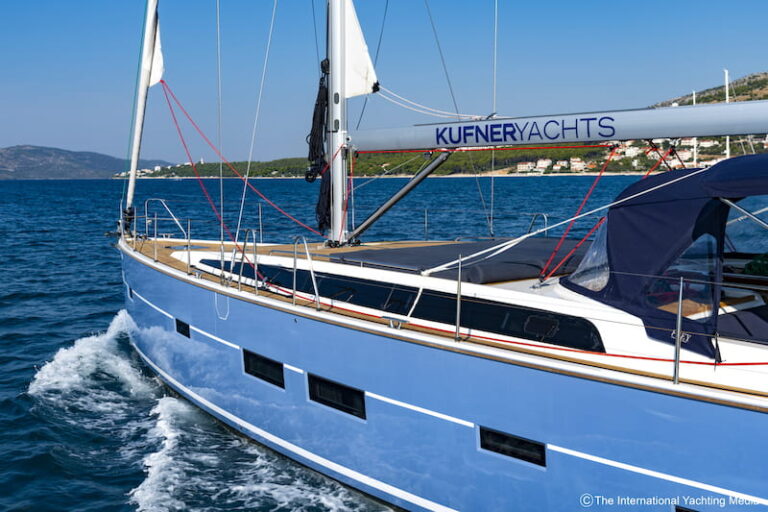 the new Kufner 50 in Croatia. The boat, a sailing yacht of almost 15 meters in length, is docked in the Marina of Trogir, surrounded by a spectacular setting: the charm of this ancient village built in Venetian style on a fortified island contributes to feed the sense of beauty we feel. The same feeling is confirmed as soon as we get close to the boat. Since we have already tested the Kufner 54, we perfectly know that these boats are specifically built for the charter world but something’s not making sense here… Indeed, a particular design attention is immediately perceivable, especially in the division of the deck spaces, in the choice of Harken-branded equipment and our curiosity rises dramatically.
the new Kufner 50 in Croatia. The boat, a sailing yacht of almost 15 meters in length, is docked in the Marina of Trogir, surrounded by a spectacular setting: the charm of this ancient village built in Venetian style on a fortified island contributes to feed the sense of beauty we feel. The same feeling is confirmed as soon as we get close to the boat. Since we have already tested the Kufner 54, we perfectly know that these boats are specifically built for the charter world but something’s not making sense here… Indeed, a particular design attention is immediately perceivable, especially in the division of the deck spaces, in the choice of Harken-branded equipment and our curiosity rises dramatically.
Damir Kufner, the owner of the shipyard located just a few kilometers from here, which we will then visit to understand the construction techniques and processes, is available to tell about the boat. He explains that he has always owned an important yacht charter society and that, having never been satisfied with the boats available on the market, not even those specifically designed but still too delicate for the demanding chartering activities, has decided to establish a shipyard to build, after careful design and review of the construction and assembly processes, a new line of sailboats. So here is this new unit ready to test.
Kufner 50 Exteriors
We cast off and leave the marina: the sail drive and the bow thruster facilitate our manoeuvres. Unfortunately, the calm sea and the side wind are not the ideal conditions to steer a boat, but the captain decides to go out to sea without hesitation. We have to sail the channel between the islands and head South because the nearby airport determines a long no-fly zone where the use of drones is not allowed. So, I take this opportunity to observe and “live” the deck.
The transom is folding, equipped with a tackle manual system which allows to create a truly generous and welcoming bathing platform in a very easy and fast way. Connected to the deck by two steps, the aft platform can remain open during navigation without compromising the safety also guaranteed by a stay between the two quarters.
The teak, offered as standard on all the boats, covers the deck, deckhouse, steps and the aft platform, making them definitively attractive and functional. The cockpit of the Kufner 50 is ideally divided into two distinct zones: a double steering console in the stern and a living/dining area in the middle.
Two modern wheels are supported by two sturdy oblique structures equipped with an instrument panel and handrail. More specifically, the one on the left also houses the motor gear lever, but its position seems to me a little exposed to accidental impacts. The steering positions are comfortable and spacious; even the side benches for skidding navigation are deep and comfortable. The split backstay contributes to the livability of the central part of the stern.
The visibility of the sails and the mast from the steering console is guaranteed by the windows in transparent material inserted in the awning (strictly made in-house, including the tubular structures in stainless steel). The passages from the steering console to the cockpit and towards the bow are wide and allow for fast movement. The cockpit is unexpectedly large and spacious, but, after all, this is the heart of conviviality for all 12 guests. The island base containing the refrigerator and equipped with two independent folding wings can turn into an important dining table surrounded by two L-shaped sofas with padded back.
The hatchway leading to the interiors is protected by a spray hood which creates two well-sheltered zones where the passengers can put their equipment and clothes in the dry. Three stoppers and a self-tailing winch allows to trim the mainsail furler, mainsheet, vang and genoa halyard. Under power, the boat goes fast and quiet, without any vibrations, which suggests that the hull construction is sturdy and the assembly of the parts is accurate.
Construction
Lamination is exclusively manual. In addition to gelcoat, three layers of matt with vinylester resin and further layers (up to 16 at the points of greatest effort) of biaxial and multiaxial glass carpets are applied, for a total of about 4 tons of resin; a combination of ribs and keelsons forms numerous bulkheads drained by as many bilge pumps in order to keep the interiors perfectly dry.
The coupling between the hull and the deck takes place through a screw-free L-shaped overlap, glued and laminated inside. The bulkheads in thick okumé plywood are resin-coated on the hull and the deck to create a single block: the hull is thus extremely sturdy and resistant to both bending, torsion and side impacts. The mast rests on the deck, supported by a rectangular steel structure that allows greater exploitation of the international space below deck thanks to the elimination of the traditional support “pole”.
Kufner 50: sailing navigation
The true wind is blowing at around 15 knots, with some variations between 12 and 16 knots. We decide to hoist the sails. With the bow to the wind and the mainsail hoisted, we turn some degrees to give power to the sail. Then, we open the jib. The sails seem small and I think that the boat could have limited performance. But I’m wrong. Despite her size, the Kufner 50 sails fast and easily reach 7.6 knots upwind, and over 8 knots downwind.
We try to tack several times, the rigging goes smoothly, the position of the winches is perfect. Mainsail trimming is easy and fast. All the running rigging of the Kufner 50, like all the boats built by the shipyard, passes ducted under the teak deck: the result is a boat with a very large bow deck and a somptuous sun pad right forward of the spray hood. The rest of the deck is uncluttered, clean and with a good passage to the bow. The only obstacle on the side-decks is represented by the low stay cutting the passage. The passage leading to the deck house, instead, is wide and very comfortable.
Interiors
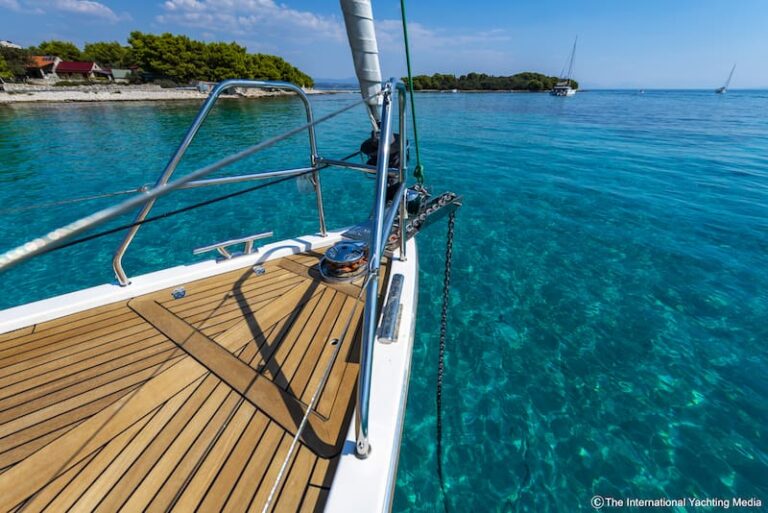
I take this opportunity to explore the interiors that immediately unveil their brightness thanks to the numerous windows positioned in the hull, the deck house and ceiling. Even the clear colors of the furniture and the walls, in contract with the darker ones of the floors, contribute to make the interiors bright: these are highly resistant artificial laminates with a brushed wood effect White Zebrano by the Italian Abet Laminati, insensitive to humidity and resistant to shocks.
The corner moldings, instead, are in natural solid oak wood while the interior construction is in poplar plywood. The shipyard builds semi-custom boats, which means that the owner can select the layout he prefers in terms of cabins, bathrooms, galley and so on. The unit we’re testing, for example has three 5 cabins and 3 bathrooms: two double cabins in the stern with en-suite bathroom; two bunk-bedded cabins and one bathroom; and the master cabin with its private bathroom in the bow.
The dinette is huge, with a large fixed table (the base includes some doors and there is even a microwave oven) and a U-shaped sofa all around. On the opposite side, an unusual fully-equipped kitchen cabinet runs from one end of the living room to the other: once again conviviality is guaranteed!
The starboard side of the salon is furnished with a linear sofa while some folding shelves above the kitchen galley create an additional lunch/breakfast area. The chart table is very large, with two walls specifically dedicated to navigation tools and electrical panel (made with great care).
The craftsmanship of the workers and the use of modern technologies, such as the numerically controlled two-axis pantograph cutter, translate into a boat of high construction level and good aesthetic value, without neglecting ease of maintenance.
In conclusion, the Kufner is neither a particularly sophisticated boat nor a mass-produced one: what is noticed is a good compromise with a very high quality/price ratio.
As mentioned above, the shipyard builds custom boats… The owner can choose from a wide range of finishing, colour, layout, equipment and accessories options, including the possibility to reproduce the vintage charm of certain famous boats of the past.
The limit is only your imagination, not your wallet.
Kufner 54 Technical Specs
| LOA | 14.93 m |
| Beam | 4.75 m |
| Dreaft | 2.5 m |
| Cabins | 5 |
| Displacement | 20,400 kg |
| Ballast | 5450 kg |
| Mainsail | 71.6 m2 |
| Jib | 69.2 m2 |
| Max Mast height | 24 m |
| I | 21 m |
| E | 7.5 m |
| Fuel Capacity | 270 l |
| Water Capacity | 2×430 l |
| Engines | 84 HP Yanmar |
| Design Category | A |
| CE Category | CRS |
| Design Category | D&D Design |
| Bathrooms | 3 |
| Tola Berths | 10+2 |
| Propulsion | Saildrive |

